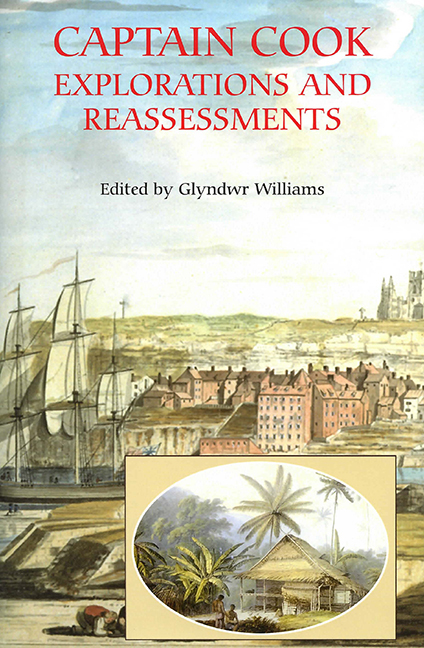Book contents
- Frontmatter
- Contents
- List of illustrations
- Contributors
- Acknowledgements
- Abbreviations
- Introduction
- Part I The Years in England
- 1 Cook's nursery: Whitby's eighteenth-century merchant fleet
- 2 ‘Remember me to my good friend Captain Walker’: James Cook and the North Yorkshire Quakers
- 3 James Cook and the Royal Society
- Part II The Pacific Voyages
- Part III Captain Cook and his Contemporaries
- Part IV The Legacy of Captain Cook
- Index
1 - Cook's nursery: Whitby's eighteenth-century merchant fleet
from Part I - The Years in England
Published online by Cambridge University Press: 25 October 2017
- Frontmatter
- Contents
- List of illustrations
- Contributors
- Acknowledgements
- Abbreviations
- Introduction
- Part I The Years in England
- 1 Cook's nursery: Whitby's eighteenth-century merchant fleet
- 2 ‘Remember me to my good friend Captain Walker’: James Cook and the North Yorkshire Quakers
- 3 James Cook and the Royal Society
- Part II The Pacific Voyages
- Part III Captain Cook and his Contemporaries
- Part IV The Legacy of Captain Cook
- Index
Summary
Whitby, in North Yorkshire, seems a very unlikely place to have owned the sixth largest outport fleet in England for most of the eighteenth century. It faces due north from its narrow estuary, at the mouth of a 24-mile-long river described, in 1720, as ‘a little nameless river, scarce indeed worth a name’ by Daniel Defoe. There is no major river system such as that which backs the Humber or the Thames. Indeed, the tidal estuary is only one mile long, and at its maximum now 120 yards wide. There is no fertile hinterland and no great mineral deposit, and yet, as Defoe observed, ‘they build very good ships for the coal trade, and many of them too, which makes the town rich’.
The port and its fleet
The size of the English merchant fleet in the middle of the eighteenth century is difficult to calculate, since the statistics submitted to London from the individual ports were very imperfect. The preamble to the principal source, BL Add. MS 11,255, states that it is:
An account of the Tonnage of all Ships and Vessels belonging to each respective Port in England that have traded to or from foreign ports or coastwise or have been employed as Fishing vessels distinguishing each sort and each year and accounting each vessel once for the year.
An accompanying letter dated 21 January 1782 from J. Dalley at the Customs House makes the point that during wartime, and especially during the War of American Independence, there was an apparent decrease in tonnage because of the number of vessels removed from trade as either privateers or transports. The latter counted as King's ships and did not report inwards or outwards.
BL Add. MS 11,255 gives no figure at all for Whitby in 1747, when Cook first appeared on Whitby Muster Rolls, but the surrounding years’ returns suggest a fleet during his time at Whitby of between 10,000 and 20,000 tons burthen. We know from later records held within Whitby that the totals given in BL Add. MS 11,255 are serious under-estimates, as Dalley suspected, and as they probably were for every other port. Suffice to say that Whitby's relative position in a league table of ship-ownership would have remained level for most of the century.
- Type
- Chapter
- Information
- Captain CookExplorations and Reassessments, pp. 7 - 20Publisher: Boydell & BrewerPrint publication year: 2004

